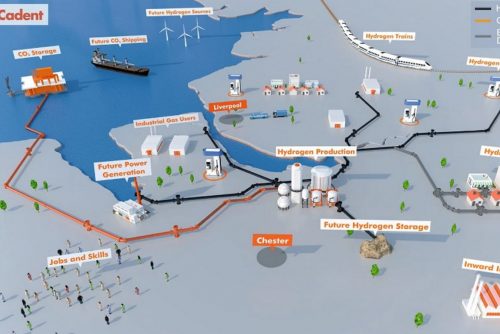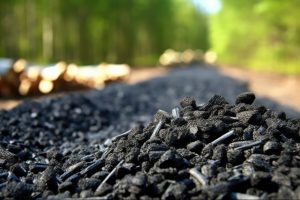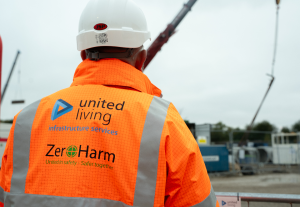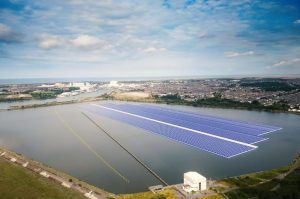Agreement forged over HyNet North West CO2 transportation and storage

Italian integrated energy company, Eni, and the UK Government have forged a deal over the transportation and storage of carbon dioxide at the HyNet North West industrial CCS (carbon capture and storage) cluster.
The heads of terms agreement paves the way for the completion of definitive agreements in the coming months, and is an important step towards HyNet North West becoming fully operational as the world’s first asset-based regulated CCS business, providing carbon transportation and storage for companies in the North West of England and North Wales.
Eni aims to store carbon dioxide in depleted gas fields in Liverpool Bay, helping the UK to achieve its net zero targets by decarbonising industrial activities in the region quickly and at a competitive cost.
It believes CCS could be crucial in energy transition strategy and it becomes a significant business for the company.
HyNet North West will transform one of the country’s most energy-intensive industrial districts into one of the world’s first low-carbon industrial clusters.
The project will help preserve thousands of local jobs by supporting the decarbonisation of cement, energy, chemicals as well as attracting investment into new industries, thus creating jobs.
HyNet North West is expected to be operational by the middle of the current decade with a storage capacity of approximately 4.5 million tonnes of CO2 per year in the first phase.
It has the potential to remove approximately 10 million tonnes annually after 2030. HyNet North West will make a major contribution to the UK’s target of storing 20-30 million tonnes of CO2 annually by 2030.
Eni’s CEO, Claudio Descalzi, said: “CCS will play a critical role in energy transition, cutting safely emissions from industries that currently don’t have the technology to do so another way.
“Today’s agreement is a significant step towards establishing a significant new industry for the country. The heads of terms outline a regulated model that can help the CCS industry achieve scale and provide the certainty needed for private sector investment.”
He added: “This kind of close cooperation with the public sector will be critical to developing the kind of groundbreaking projects we need to address the climate challenge.”
Eni has developed extensive expertise in storing gas in depleted fields over many decades. It intends to use this to repurpose some of its existing upstream assets into carbon dioxide storage hubs to decarbonise both its own and third parties’ industrial activities at a competitive cost and with fast time to market.
Meanwhile, planning permission has been granted for a state-of-the-art new carbon-capture facility at Lingley Mere business park in Warrington.

Mersey Biochar
The project, Mersey Biochar, will lock away thousands of tonnes of carbon a year into biochar, a versatile product with a range of uses from improving soil quality to decarbonising the construction industry.
Led by climate-action organisations Severn Wye Energy Agency and Pure Leapfrog, a consortium of experts is behind the project which will be hosted by United Utilities at Lingley Mere Business Park. Construction is due to begin in November, with the unit supplied by PyroCore and the facility built by energy specialists Vital Energi.
Capturing carbon and other greenhouse gases will be critical for the UK’s plans to meet net zero by 2050 and the facility promises to make an important contribution to the country’s carbon-capture potential.
Severn Wye CEO Sandy Ruthven said: “Mersey Biochar represents an important step forward in the UK’s carbon capture ambitions and getting planning permission for the Lingley Mere site is an exciting start. We hope to prove this technology can be used across the UK to help tackle climate change.”
Vital Energi’s associate design manager, Rob Greenwood, said: “With the UK set to continue using oil and gas in the short term, carbon capture has the potential to play a huge part in the UK’s transition from fossil fuels to a net zero economy and this project can demonstrate an innovative new application for an existing, trusted technology.”
Mersey Biochar will capture carbon from green waste or ‘biomass’, in this case a byproduct of local forestry management, which would otherwise release its carbon back into the atmosphere as it decays. The carbon is locked in through a process called pyrolysis, which heats the biomass in a virtually oxygen-free environment without the noise or fumes commonly associated with other types of burning. The resulting biochar stores the carbon for centuries and every tonne produced can remove up to 3.6 tonnes of CO2 from the atmosphere. The facility is expected to produce 700 tonnes of biochar each year.
The vision for the site is that nothing will go to waste – once the facility’s carbon capture capabilities are proven, the heat generated by the process is intended to be redirected to heat and power United Utilities’ buildings – part of the company’s long term sustainability goals.








